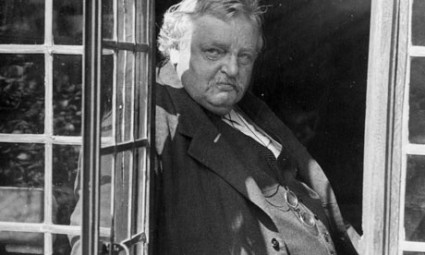August 13 | ![]() 0 COMMENTS
0 COMMENTS ![]() print
print

Pope gives blessing to cause for Chesterton
English author GK Chesterton, best known for his Father Brown stories, has begun the journey to Beatification and Canonisation, with the blessing of the Pope.
Just days before he was elected Pope in March, the then Archbishop of Buenos Aires, Cardinal Jorge Bergoglio, wrote to a Chesterton society in Argentina approving the wording of a private prayer calling for his Canonisation.
The Pontiff is said to be a fan of the author (above), one of whose most admired books was a life of St Francis of Assisi.
Bishop Peter Doyle of Northampton, the diocese in which Chesterton lived, has ordered an examination of the life of the Catholic writer, and is seeking a suitable cleric to begin an investigation into the potential for opening a cause for Chesterton.
“A lot of people have been hoping for this for a long time,” Dale Ahlquist, president of the American Chesterton Society, said “Chesterton has a huge devotion to him around the world. There are people who have long believed that he is someone who should be raised to the altars and have already privately started asking for his intercession.”
Chesterton lived from 1874 to 1936. Under the influence of his wife Frances, he became a devout Anglican Christian. He later converted to Catholicism in 1922.
Known for his witty writing and love of finding truth in apparent paradox, Chesterton authored literary essays, novels, poetry, plays, philosophical works and Christian apologetics. His short stories include the Father Brown mystery series, and he influenced the thinking of many converts and writers, including CS Lewis.
Although admirers admit that Chesterton, a cigar-smoking journalist and writer, is not a typical candidate for sainthood, they say his personal character showed the author, who died in 1936, was a deeply spiritual individual.
Although there is not a Scottish Chesterton appreciation society the author thought highly of the Scots.
“Of all the great nations of Christendom, the Scotch are by far the most romantic,” he wrote in 1912. “I have just enough Scotch experience and just enough Scotch blood to know this in the only way in which a thing can really be known; that is, when the outer world and the inner world are at one. I know it is always said that the Scotch are practical, prosaic, and puritan; that they have an eye to business.”











